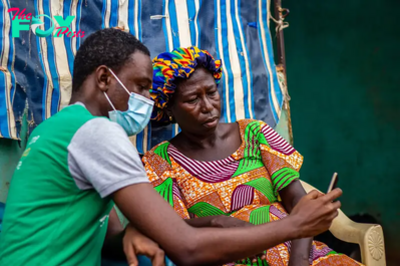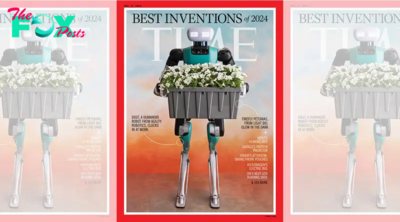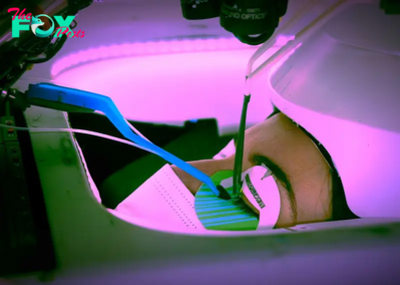Technology
We Need to be Ready for Biotech’s ChatGPT Moment
Imagine a world where everything from plastics to concrete is produced from biomass. Personalized cell and gene therapies prevent pandemics and treat previously incurable genetic diseases. Meat is lab-grown; enhanced nutrient grains are climate-resistant. This is what the future could look like in the years ahead.
The next big Game-changing revolution is in biology. It will allow us to more effectively fight disease, feed the planet, generate energy, and capture carbon. Already we’re on the cusp of these opportunities. Last year saw some important milestones: the U.S. approved the production and sale of lab-grown meat for the first time; Google DeepMind’s AI predicted structures of over 2 million new materials, which can potentially be used for chips and batteries; Casgevy became the first approved commercial gene-editing treatment using CRISPR. If I were a young person today, biology would truly be one of the most fascinating things to study.
Like the digital revolution, the biotech revolution stands to transform America’s economy as we know it—and it’s coming faster than we expect, turbocharged by AI. Recent advances in biotech are unlocking our ability to program biology just as we program computers. Just like OpenAI’s ChatGPT trains on human language input to come up with new text, AI models trained on biological sequences could design novel proteins, predict cancer growth, and create other useful consumables. In the future, AI will be able to help us run through millions of theoretical and actual biological experiments, more accurately predicting outcomes without arduous trial-and-error—vastly accelerating the rate of new discoveries.
We’re now on the verge of a “ChatGPT moment” in biology, with significant technological innovation and widespread adoption on the horizon. But how ready is America to do what it takes to bring it to fruition? I’m incredibly excited about this forthcoming breakthrough moment, but it’s paramount to ensure that it will happen on our shores. That is why I’m serving on the National Security Commission on Emerging Biotechnology. As the Commission recently wrote in its recent interim report, “Continued U.S. leadership in biotechnology development is not guaranteed.”
America has a History of being the first mover in an emerging industry before losing its leadership when outsourcing its production to other parts of the world. This pattern has repeated itself in high-tech sectors like passenger cars, consumer electronics, solar panels, and, most notably, semiconductors. To avoid the same mistake, it’s crucial we secure a reliable supply chain domestically and internationally that covers everything from raw material extraction to data storage while we build the necessary talent pipeline. Relying on other countries for key components in bioTechnology presents enormous economic and national security risks. For instance, leaving our genetic information in the hands of our adversaries could potentially aid them in developing a bioweapon used to target a specific genetic profile. President Biden’s recent executive order aims to prevent sales of such sensitive personal data to China and other adversarial countries.
An investment in both human capital and physical infrastructure will be critical to continued U.S. leadership in biotech. Such investments need not come just from the government but should also provide incentives to stimulate more private funding, as did the CHIPS and Science Act. There’s no overstating how central the bioeconomy will be to U.S. growth over the next fifty years. At present, the bioeconomy generates at least 5% of U.S. GDP; in comparison, semiconductors only constitute around 1% of U.S. GDP. By some measures, 60% of physical inputs to the global economy could be grown with biological processes—the promise of biology is vast for tackling some of humanity’s biggest challenges, including climate change.
As AI boosts our ability to engineer biology, we will need guardrails in place. While it’s easy to conjure doomsday scenarios of lone-wolf amateurs building a bioweapon from scratch right from home, studies by Rand Corporation and OpenAI have argued that current large language models like ChatGPT do not significantly increase the risk of the creation of a biological threat, as they don’t provide new information beyond what is already on the internet. And it’s also important to bear in mind that just because an AI model can design novel pathogens doesn’t mean users would have the secure wet-lab infrastructure and resources to create them.
Nonetheless, with AI tools improving in accessibility and ease of use, the biorisk landscape is ever evolving. Soon, more complex foundation models could provide malicious actors with more data, scientific expertise, and experiment troubleshooting skills, helping to suggest candidate biological agents and aid them in ordering biological parts from a diverse set of suppliers to evade screening protocols.
Organizations like the Federation of American Scientists and the Nuclear Threat Initiative have recommended structured red-teaming—actively seeking vulnerabilities to preemptively secure our biosecurity infrastructure—for current DNA sequence screening methods and evaluating the biological capabilities of AI tools. More than 90 scientists just signed a call to ensure AI develops responsibly in the field of protein design. We’ll need both standards for developing as well as requirements to implement risk assessments, as well as public-private sector collaboration in creating a robust economy of testing.
By now, most of us have likely eaten, been treated by, or worn a product created with biotech. Soon, the Technology will disrupt every industry and fundamentally reshape our regular lives: new fertility treatments will transform parenthood; cellular reprogramming could start to reverse the aging process; biocomputing will power the computers of tomorrow. Standing on the brink of these innovations, we as a country have the unique chance to drive how biotech unfolds, realize its immense benefits, and shape the norms for responsible innovation—before other countries race ahead.
-

 Technology19h ago
Technology19h agoBreaking up Google? What a Chrome sell-off could mean for the digital world | The Express Tribune
-

 Technology1d ago
Technology1d agoAI harm is often behind the scenes and builds over time – a legal scholar explains how the law can adapt to respond
-

 Technology1d ago
Technology1d agoNewborn planet found orbiting young star, defying planet formation timeline | The Express Tribune
-

 Technology1d ago
Technology1d agoAwkwardness can hit in any social situation – here are a philosopher’s 5 strategies to navigate it with grace
-

 Technology1d ago
Technology1d agoNo need to overload your cranberry sauce with sugar this holiday season − a food scientist explains how to cook with fewer added sweeteners
-

 Technology1d ago
Technology1d agoTeslas are deadliest road vehicles despite safety features: study | The Express Tribune
-

 Technology2d ago
Technology2d agoUS pushes to break up Google, calls for Chrome sell-off in major antitrust move | The Express Tribune
-

 Technology2d ago
Technology2d agoPublic health surveillance, from social media to sewage, spots disease outbreaks early to stop them fast


























